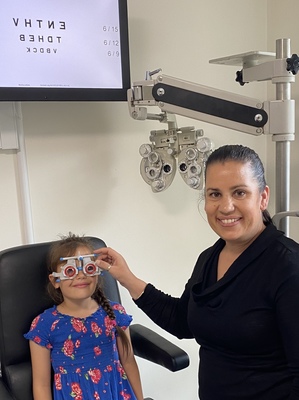Did you know that approximately one in five kids has an undetected vision problem that could affect their performance in the classroom?
That’s why parents are being urged to book an eye test at the beginning of the school year.
Here, optometrist Gemma Cowan answers common questions about children’s eyesight.
What are the common vision problems in children?
The three most common problems are myopia (shortsighted), hyperopia (longsighted) and astigmatism (uneven curvature of the cornea). Unless you test their eyes, quite often these issues will go undetected. It’s not unusual for kids to assume they way they see is normal, they simply may not be aware that they could have the potential to see better! So often they don’t tell their parents if they are having difficulties.
How could vision problems affect my child’s learning?
It may be something as simple as not being able to see the board clearly in the classroom. But often the problems present in a more subtle manner. There may be issues with your child’s focusing system, which could affect their ability to read or concentrate in class. This could happen any time from Prep onwards, but may impact kids in the higher secondary levels as the study demand increases.
What symptoms should parents be looking for?
Sometimes there simply aren’t any symptoms, but it helps to look for things like complaints of headaches or sore eyes, squinting, frequent blinking or rubbing of the eyes, red or watery eyes, or closing one eye to read. You should also consider an eye test if your child has difficulty concentrating, tires easily, has shown a delayed progress in reading ability, skips lines or omits words while reading.
Is there a treatment for vision problems?
Yes, there are a range of options for many vision problems. It could be glasses or contact lenses, or I might recommend focussing or eye muscle exercises depending on the underlying issue. As with many problems, the earlier it is detected, often the easier it is to treat.
What age should I consider an eye test for my child?
You can have a test at any age from six months and up really, especially if there is a turned eye. I recommend a full eye test from approximately three and half years old. If there is something like amblyopia (lazy eye) present, the treatment is more effective if it is detected early. And as there are no symptoms, an eye test is the only way to detect it.
For more information visit Gemma at Beaconsfield Eyecare 45 Wallace Street Beaconsfield. Phone 8726 9977 or visit www.beaconsfieldeyecare.com.au








